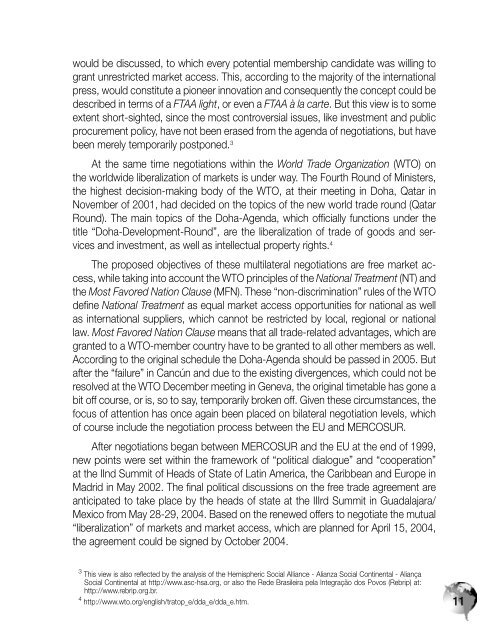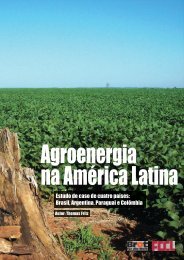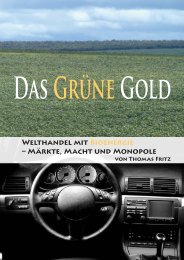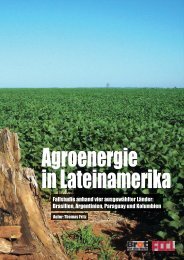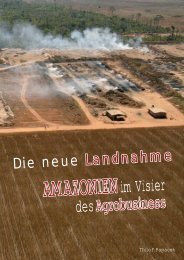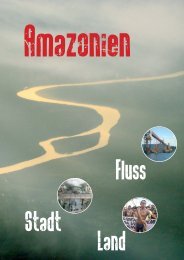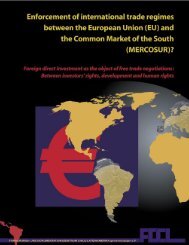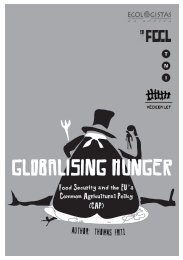Download - FDCL
Download - FDCL
Download - FDCL
You also want an ePaper? Increase the reach of your titles
YUMPU automatically turns print PDFs into web optimized ePapers that Google loves.
would be discussed, to which every potential membership candidate was willing to<br />
grant unrestricted market access. This, according to the majority of the international<br />
press, would constitute a pioneer innovation and consequently the concept could be<br />
described in terms of a FTAA light, or even a FTAA à la carte. But this view is to some<br />
extent short-sighted, since the most controversial issues, like investment and public<br />
procurement policy, have not been erased from the agenda of negotiations, but have<br />
been merely temporarily postponed. 3<br />
At the same time negotiations within the World Trade Organization (WTO) on<br />
the worldwide liberalization of markets is under way. The Fourth Round of Ministers,<br />
the highest decision-making body of the WTO, at their meeting in Doha, Qatar in<br />
November of 2001, had decided on the topics of the new world trade round (Qatar<br />
Round). The main topics of the Doha-Agenda, which officially functions under the<br />
title “Doha-Development-Round”, are the liberalization of trade of goods and services<br />
and investment, as well as intellectual property rights. 4<br />
The proposed objectives of these multilateral negotiations are free market access,<br />
while taking into account the WTO principles of the National Treatment (NT) and<br />
the Most Favored Nation Clause (MFN). These “non-discrimination” rules of the WTO<br />
define National Treatment as equal market access opportunities for national as well<br />
as international suppliers, which cannot be restricted by local, regional or national<br />
law. Most Favored Nation Clause means that all trade-related advantages, which are<br />
granted to a WTO-member country have to be granted to all other members as well.<br />
According to the original schedule the Doha-Agenda should be passed in 2005. But<br />
after the “failure” in Cancún and due to the existing divergences, which could not be<br />
resolved at the WTO December meeting in Geneva, the original timetable has gone a<br />
bit off course, or is, so to say, temporarily broken off. Given these circumstances, the<br />
focus of attention has once again been placed on bilateral negotiation levels, which<br />
of course include the negotiation process between the EU and MERCOSUR.<br />
After negotiations began between MERCOSUR and the EU at the end of 1999,<br />
new points were set within the framework of “political dialogue” and “cooperation”<br />
at the IInd Summit of Heads of State of Latin America, the Caribbean and Europe in<br />
Madrid in May 2002. The final political discussions on the free trade agreement are<br />
anticipated to take place by the heads of state at the IIIrd Summit in Guadalajara/<br />
Mexico from May 28-29, 2004. Based on the renewed offers to negotiate the mutual<br />
“liberalization” of markets and market access, which are planned for April 15, 2004,<br />
the agreement could be signed by October 2004.<br />
3 This view is also reflected by the analysis of the Hemispheric Social Alliance - Alianza Social Continental - Aliança<br />
Social Continental at http://www.asc-hsa.org, or also the Rede Brasileira pela Integração dos Povos (Rebrip) at:<br />
http://www.rebrip.org.br.<br />
4 http://www.wto.org/english/tratop_e/dda_e/dda_e.htm.<br />
11


